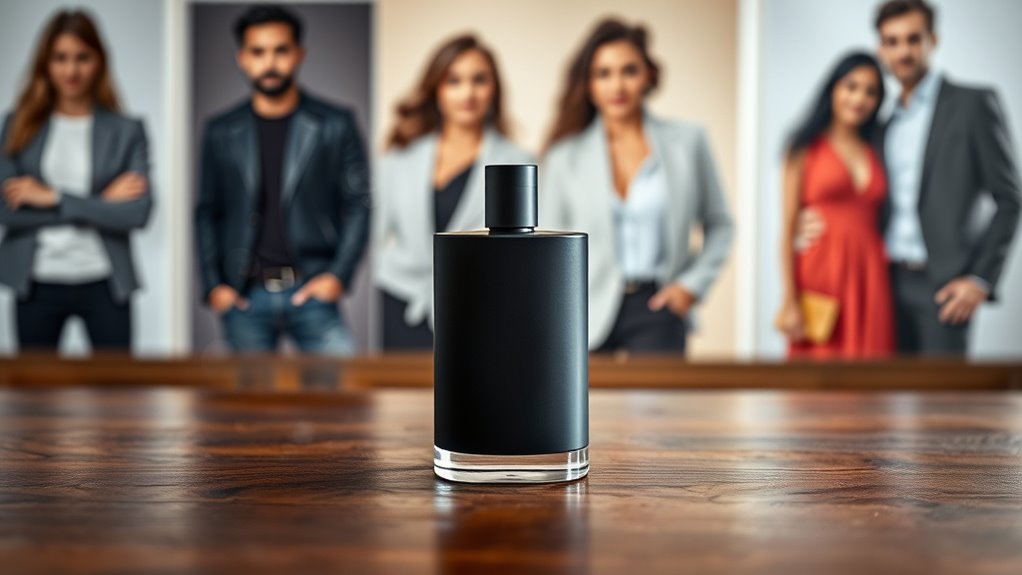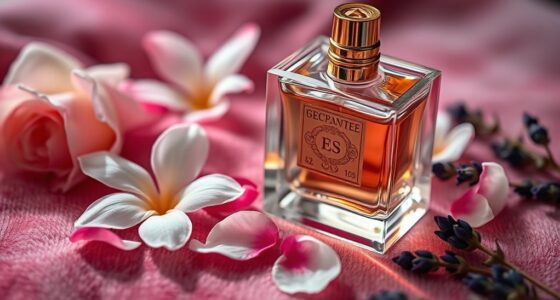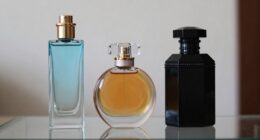Unisex scents challenge the traditional marketing stereotypes by focusing on individual preferences rather than gender labels. Instead of pairing floral notes with women or woody scents with men, these fragrances aim to suit everyone’s unique style and personality. Marketing often emphasizes inclusivity, but the reality is that unisex fragrances are about personal expression and breaking down societal barriers. If you want to discover how these scents truly redefine perceptions, keep exploring further.
Key Takeaways
- Marketing often portrays unisex scents as inclusive and versatile, but some may still carry subtle stereotypes or marketing-driven features.
- In reality, unisex fragrances blend traditionally masculine and feminine notes, allowing personal preferences to guide choice beyond gender labels.
- Many brands aim to challenge gender stereotypes in their marketing, emphasizing authenticity and individual expression over traditional gendered marketing.
- The perception of unisex scents as truly gender-neutral depends on personal interpretation, as scent notes can evoke different associations regardless of marketing claims.
- Overall, unisex fragrances are more about personal style and less about societal stereotypes, aligning marketing messages with the reality of individual preference.

Unisex scents have gained popularity because they break traditional gender boundaries and offer versatile options for anyone seeking a fresh, balanced fragrance. You might think that these scents are just a marketing gimmick, but they actually tap into a deeper desire for gender neutrality in personal expression. Historically, fragrance marketing has relied heavily on fragrance stereotypes—associating floral notes with femininity and woody or spicy scents with masculinity. This creates a narrow view that limits how people choose scents, often making you feel like you have to conform to societal expectations. However, unisex fragrances challenge these stereotypes, offering a more inclusive approach that emphasizes individual preference over gender labels. They’re designed to appeal to everyone, regardless of gender identity, encouraging you to explore scents based on what you like rather than what’s traditionally “meant for” your gender. This shift reflects a broader cultural movement toward gender neutrality, where the focus is on personal authenticity and breaking free from stereotypical roles.
When you encounter marketing for unisex scents, it’s easy to assume they’re just trying to sell a product without much substance. But the reality is that many brands are genuinely trying to redefine how fragrances are perceived. They focus on creating scents that balance traditionally masculine and feminine notes, resulting in complex, layered fragrances that can be worn by anyone. This approach not only broadens your options but also fosters a more open-minded attitude toward scent choices. You don’t have to fit into a specific mold; instead, you can pick a fragrance that resonates with your personality and mood. The marketing may emphasize inclusivity and freedom of choice, but the underlying goal is to challenge the outdated notion that certain scents belong exclusively to one gender. Additionally, the concept of vetted fragrances ensures that these products meet high standards of quality and authenticity.
In truth, the reality behind unisex scents is that they encourage you to move beyond fragrance stereotypes. They allow you to explore a more authentic self-expression, free from the constraints dictated by traditional marketing. When you choose a unisex scent, you’re opting for a fragrance that’s versatile and adaptable, suitable for any occasion or mood. It’s not about fitting into a predefined box but about embracing a broader spectrum of identity and taste. As you explore these fragrances, you’ll notice that they often feature a balanced blend of notes that can appeal to your unique preferences. Ultimately, unisex scents are about celebrating diversity and individualism, breaking down barriers created by marketing and societal expectations.
Frequently Asked Questions
Are Unisex Scents Suitable for All Skin Types?
Yes, unisex scents can suit all skin types, but you should be mindful of skin reactions and ingredient sensitivities. Since everyone’s skin reacts differently, patch test new fragrances first to check for any adverse reactions. Look for scents with gentle, natural ingredients if you have sensitive skin, and avoid harsh chemicals. This way, you can enjoy unisex fragrances without worry about irritation or allergic responses.
How Do Unisex Fragrances Compare in Longevity to Gender-Specific Scents?
Imagine testing two fragrances on your skin; one unisex, one gender-specific. You’ll find unisex scents often have comparable scent longevity and fragrance durability, lasting just as long as traditional gendered perfumes. While some may fade faster, many high-quality unisex options offer impressive longevity. Ultimately, the durability depends more on the formulation than the scent’s gender label, so choose based on your preference, not stereotypes.
Can Unisex Perfumes Be Customized to Individual Preferences?
Yes, you can customize unisex perfumes to suit your preferences. Many brands offer personalization options, allowing you to adjust the scent profile to better match your taste. You might add or blend different notes, or select variations that emphasize certain aromas. This way, you create a unique fragrance that reflects your personality, ensuring the perfume feels truly yours and enhances your individual style.
Do Unisex Fragrances Typically Contain Fewer Synthetic Ingredients?
Unisex fragrances often contain fewer synthetic ingredients, as they emphasize natural components to enhance fragrance complexity. When you choose a unisex scent, you might notice a richer blend of natural ingredients, creating a more authentic and nuanced aroma. This focus on natural ingredients appeals to those seeking fragrances with depth and authenticity, making the scent more versatile and aligned with individual preferences for complexity and purity.
How Do Cultural Perceptions Influence Unisex Scent Marketing?
You should know that cultural perceptions heavily influence unisex scent marketing. Marketing strategies often play on cultural stereotypes, suggesting that certain scents are more suitable for one gender than another. These stereotypes shape how brands position their fragrances, appealing to societal norms and expectations. As a result, the marketing may reinforce or challenge these perceptions, but ultimately, cultural views guide how unisex scents are promoted and received in different markets.
Conclusion
Think of unisex scents like a chameleon blending into its surroundings. While marketing paints them as neutral, in reality, they adapt uniquely to each person, revealing different facets. Just as a chameleon’s color shifts with its environment, your scent transforms based on your skin, mood, and moment. So, don’t get caught in the illusion of strict labels. Embrace the fluidity—your signature scent is a personal story, ever-changing and uniquely yours.









